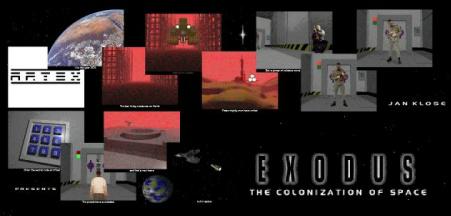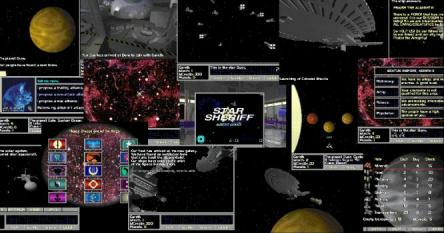|
Exodus
"Reports of my death have been greatly exaggerated." It was generally agreed last year that the Acorn games market was, effectively, dead. The most recent release had been Shuggy, and the less said about that the better. Certainly, noone expected any future games to come even vaguely near the quality of those on other platforms - Brutal Horse Power, when it finally arrived, was a good effort but noone could claim that it came anywhere near the depth of gameplay or polish of many of the racing games available on other platforms. All of which general doom and gloom made it rather unexpected when a new company, Artex Software, suddenly released a brand new game completely out of the blue - and this game was extremely well presented for a native Acorn game, and wrapped in this gloss there was, surprisingly, actually a game worth playing. The game was Exodus.
It's usually the cheaper Acorn games which are well packaged (the general rule of thumb is that the more you spend the more shoddy and cheap the presentation), and Exodus is no exception - it's a competitively priced £25 and comes in a beautiful full-colour paper box, which may not stand up to a game of football but it is certainly attractive. A ring-bound manual hints at the complexity of the game. Installing the game and then running it brings you to a nicely-drawn animated introduction. It's far from world-beating stuff, but considering the fact that the game is supplied on floppy disc it's not half bad, and it is indicative of the care and attention put into the whole game. Cleverly integrated into the introductory story is a sequence in which you need to type in a code from the manual, and there is even a small bit of story which is shown if you get the code wrong! Noone could reasonably object to this protection method - and when you play the game you'll certainly want the manual to hand (at least to start with), anyway.
Exodus is a strategy game which pits you in the rôle of the commander of a galactic empire - or at least if you succeed at the game it will become an empire! At the start you have just a fleet of ships, and the first thing you must do is choose a planet to colonise. It takes precious time to fly across the galaxy - time in which other empires can be building weapons and conquering planets - but you can visit the Space Guild (conveniently located at the centre of the galaxy) and get some advice on a suitable planet for colonisation.
Different types of planet have different characteristics, and some of them come with indigenous populations. Planets also come in different sizes - the larger the planet the greater its capacity and natural resources, but the more expensive it is to colonise. In fact, there are so many factors at play that it could all be a bit bewildering at first, but the game is designed in such a clever way that you need not actually be aware of all the subtleties at play - it is only with experience that you begin to realise the effects of various types of planet and planet features. The manual certainly doesn't tell you everything about the game, which is as it should be, or else there would be no fun in learning about the artificial galaxy contained within the game. Gameplay revolves around several disparate elements. You can choose destinations for your fleet on a map of the galaxy, but en route you might meet other ships of varying types, which sometimes you might choose to attack, or they might attack you. This leads to a realtime space battle section, which is played on a radar-type circular view of space (with everything moving on a single plane). It's a bit limited and a bit confusing, but it's an interesting aside to the rest of the game, and you can upgrade your fleet in several different ways to improve your chances of winning. You stand to capture ships and cargo.
Cargo can be traded between planets - and this is how you earn money, which is required to do just about anything in the game. You need money to buy supplies, ships, planets and all sorts of things. In particular, you need money to build on the surface of the planets you own. You can lay down several different constructions, such as weapons factories (of varying types), space ports, trading centres, power generators and mines. You can also convert arable land into farms which produce food for your people, and build cities for them which will expand if the people are prospering. In fact, you can even alter the day-to-day laws which apply to the people, build parks, schedule celebration festivals of differing size, and exercise a whole host of other options.
The other major facet of the game is the control of the attack and defence of planets. You are presented with an aerial view of a battleground, upon which you can place your troops and the enemy can place their's. The battle then starts, with you and your opponent taking it in turns to move the various units and choosing which other units to attack. There are only three types of unit, but there's still a fair bit to this part of the game, with you being able to group units together into different size groups, protect yourself in rubble and set beam-up points to send units back to your fleet.
Not all conflicts are conducted in this way, however. You can choose to bomb other planets (and build defences against such attacks), and you don't actually get to control these. You can also build up a secret service to protect you and infiltrate other rulers' cities, and if you pay your scientists enough they come up with new inventions to help you in your quest.
A whole host of menus allow you to find out how other rulers are getting on in your galaxy, to assess your current condition in various ways, and to talk to the other rulers and attempt to build trade and war agreements. The game is based around a fundamental system of turn-based moves - each turn you build all the buildings you want to, tell your fleet what to do, talk to other rulers and also trade, and then you choose to finish your turn with "wait one month", at which point all the other players (rulers) have their turns. In a one-player game the other rulers are all computer-controlled, but you can also play a multi-player game, with up to five people playing at once.
If this all sounds horrendously complex, then the designers have thought of this. You can choose to let the computer control all your battles - both land-based and space-based - automatically for you, so all you need to do is lay out your general strategies and forget about the actual control of the conflicts. Apart from all the parts of the game which are immediately obvious, there are a whole host of extra things which you only discover after you've been playing for a bit - environmental changes take place on planets, random events (such as discoveries of unknown species) occur, and you can even pop along to the Space Guild and play on one of the arcade machines there! (And it's good fun, too!) You can choose to aim for different goals when you play the game, and you can also choose a skill level - even if you manage to complete the game on one setting you will still have several other options to try it on!
As you can see from the length of my explanation of the game above, which doesn't even mention some of the features of the game, there is a lot of attention to detail in Exodus! And, thank goodness, this doesn't just stop at the gameplay stage, but is carried through throughout the game to encompass all the graphics and music. You even get little cut-scene animations every so often, which really do help set the mood of the game perfectly. The graphics aren't particularly high-resolution, but they are expertly rendered and very carefully designed, and the attention to detail even descends to little things like getting the reflections correct in the animations. The music is wonderful, and it changes depending upon the context of the game at a particular point. The sound is quite limited, but it suffices, and given the restraints of a floppy release Artex were pretty restricted in their viable options on this front.
The game is quite difficult to start with - not least, it isn't precisely clear exactly what you have to actually do! I didn't initially realise the significance of the "wait one month" option, for example, which is central to the whole game. There is a lot of material in the manual, but it isn't particularly well arranged. Certainly, more could have been done to help you "get going" with the game - a tutorial option would have been very nice, for example. But then again, this is in a way some of the appeal of the game - you are dumped in a complex galaxy, and you must make sense of it and become supreme ruler of the galaxy (or most rich, or whatever aim you choose). It's up to you to figure out exactly how to do this, right from the word go! In a way, it's a galactic adventure game which is different every time.
Exodus is a really great game. It isn't perfect - the limits of a floppy release certainly don't help it - but it still contains several unique ideas which haven't been seen in other games in quite this form, and frankly I think it is one of the biggest steps forward the 32-bit Acorn games scene has taken in the past few years, especially in terms of its presentation. If this is indicative of the quality of Artex's future releases then they could truly be called the saviour of Acorn games. The final, beautiful icing on this rather large cake is that Exodus is competitively priced at only £25. If you have even the slightest inclination towards strategy games, then I can unreservedly recommend that you go out and buy Exodus at once. And there's nothing quite like it on any other platform.
Review by Gareth Moore, Copyright ©1997 and 1998
Exodus is compatible with all Acorn RISC OS computers with at least 2Mb RAM, a hard disc and RISC OS 3. Exodus is also available in a German language version, distributed by ACE (see below).
Distributors
Exodus is distributed by:
...this page last updated: 1/3/98... |
|
©Gareth Moore 1994-2001
Acorn Gaming is a completely independent publication and has no official connection with any company |
![[REVIEWS]](../../Core/BRev.gif)
![[ 5/5 ***** 5/5 ]](../gfx/5stars.gif)


![[Three Space Guild screenshots, scaled]](ExSGc.gif)
![[Meeting a pirate fleet, then fighting it]](ExPir.jpg)
![[Celebrations!]](ExCel.jpg)
![[Lunar battle]](ExLun.jpg)
![[Cut scene animation]](ExCha.jpg)
![[Hostile intentions!]](ExDun.jpg)
![[Planetary statistics]](ExSta.jpg)
![[A planet's surface]](ExPla.jpg)
![[Oops. Game Over!]](ExGO.jpg)
